Track Review from Estoril: Lamborghini Temerario Might Just Outshine V12 Revuelto
Last year during Monterey Car Week, Lamborghini unveiled the Huracán supercar’s highly anticipated successor, which will serve as the final step in a broader hybrid strategy that began with the flagship Revuelto and Urus SUV. Dubbed the Temerario, the new model earned immediate coverage largely thanks to the borderline unbelievable stats of that hybrid powertrain, highlighted by a twin-turbo V8 that can rev to 10,000 rpm. Alongside three electric motors borrowed from the Revuelto, combined output peaks at an absurd 907 horsepower.
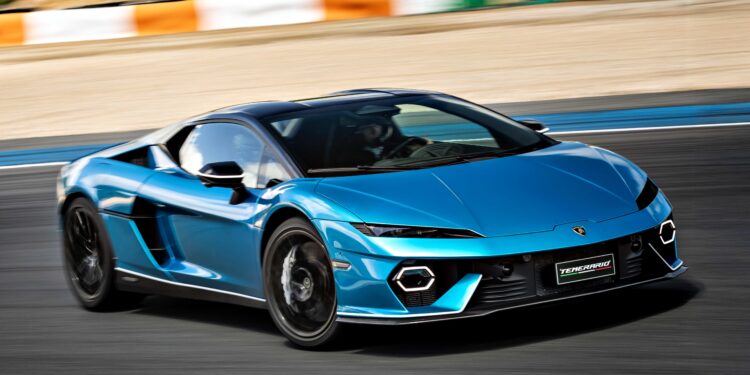
Almost a year later, the time finally arrived for media to preview the Temerario in a dynamic launch program held at Estoril Circuit, the former F1 and MotoGP racetrack in Portugal. With a long front straight and several tricky, technical turns, Estoril served as the perfect place to show off the Temerario’s all-out power and engaging performance, plus some of the nifty drifting and launch control features that advanced all-wheel-drive hybrid tech make possible.
Setting a New Personal Top Speed Record
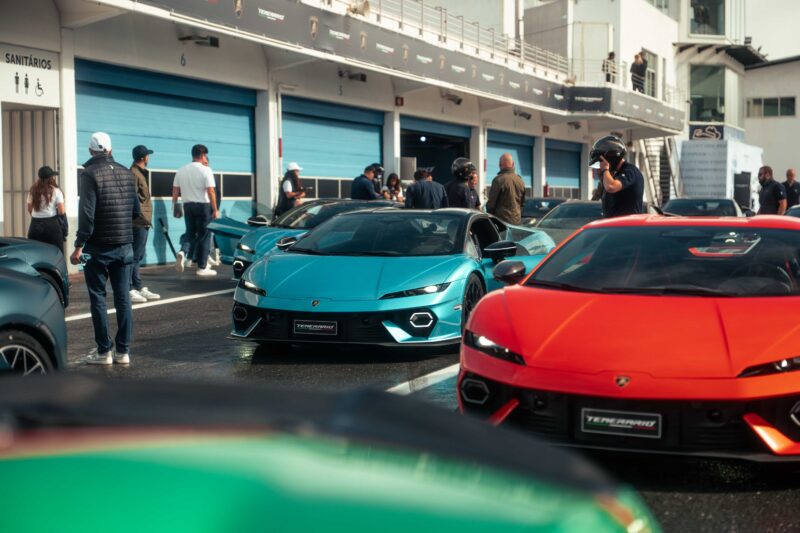
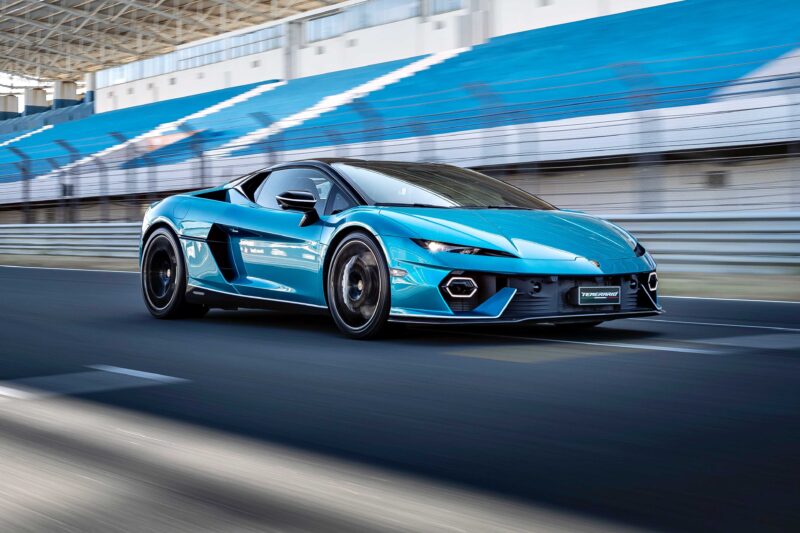
Even before climbing into a Temerario, as I slipped on a head scarf and helmet, echoes off the grandstand hinted at the fun ahead. EU emissions regulations dictate the use of gasoline particulate filters, so the V8 unfortunately lacks the high-end thrill of a Huracán V10 or a Revuelto V12, but the sheer pace as the previous drive group whipped by still sounded unmistakable.
Soon enough, I found out myself, after a first sighting lap that I spent warming up the tires and acclimating to the track layout. By the time I let loose onto the front straight, full EV and internal-combustion power working together in an understated concerto, I glanced down at the speedometer and spied 301 kph – or 187 mph, good enough to set a new personal record as my highest top speed ever and best the Corvette ZR1 that I took to 181 mph earlier this year.
And we were just getting started. The rest of that first stint revealed that I’d been babying the Temerario. No need to act timid here, instead Lambo’s latest and quite possibly greatest supercar appreciates a bit of intrepid helmsmanship, quick flicks of the light steering, and heavy doses of full-throttle acceleration. After just a few laps, I easily found and exceeded the limits of the Bridgestone Potenza Sport tires, the magic point where slip-and-slide actually allows for more speed and confidence beyond the edge of full traction.
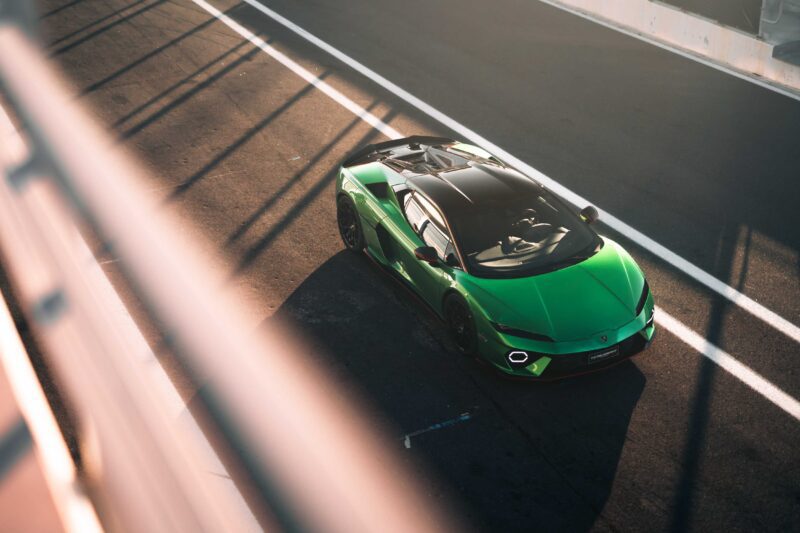
I spent the rest of the day after that first stint in a Temerario equipped with the lightweight “Alleggerita” package, which adds Potenza Race tires as well as a host of carbon fiber to save pounds and a titanium muffler that further enhances the engine’s soundtrack. The Alleggerita package dictated slight modifications to the Temerario’s suspension tuning to handle the additional cornering load, too. But the tires alone unlocked a whole new level of performance, with more feedback and grip that improved the steering feedback, clamped down the braking, and accentuated all-out grip while blasting back out of corners.
So much so, that once I found a rhythm, the speedo eventually topped out at 308 kph – not too far off the top speed of 340 kph. And I left a fair amount on the table, too, because my lead-follow instructor, senior attributes and performance developer Mario Fasanetto, had me braking early at the end of the front straight in the name of safety. I figure that holding off and trusting the Temerario more into Turn 1, I might have easily hit 315 kph.
Slipping and Sliding Around Estoril’s F1 track
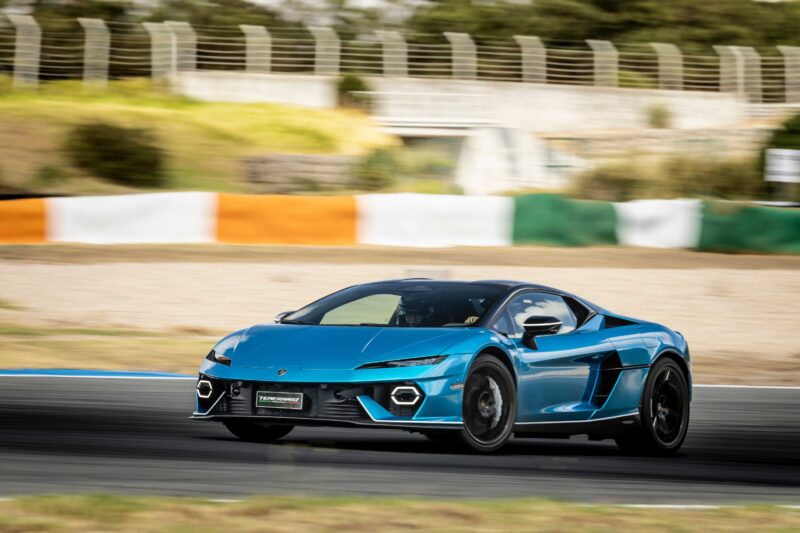
Later in the day, Fasanetto hopped into the passenger seat to coach me through a few tries at the Temerario’s drift mode. Turning on drift mode requires simply pushing a button on the steering wheel, then spinning a dial to select one of three levels: Level 1 targets 15 degrees of drift angle, Level 2 allows for 30 degrees, and Level 3 maxes out at 40 degrees.
In each mode, the Temerario’s advanced traction control computations prioritize front-wheel torque vectoring by the dual electric motors to help enable and extend slides. I started out in Level 2, and lit up the rear tires easily by initiating a quick hit of steering and throttle simultaneously. But I struggled to finish the drift smoothly after a second or so spent sideways, and even spun out on my next attempt.
Surprisingly, stepping up to Level 3 actually made the process easier, with more predictable throttle response and greater stability over the nose. Or maybe practice makes perfect, but by the last couple of runs, Fasenetto started cheering and might have even exclaimed “Like a pro!”
Next, we cruised back over to the start of Estoril’s front straight to give launch control a go. Again, I pushed a little button on the steering wheel – this time on the left of the Lambo badge – to activate the new mode. Then, I braked with my left foot and pushed the accelerator pedal to the floor for two seconds to let the V8’s 70-millimeter turbos build boost, until I just stepped off the brake. All four tires only chirped for a millisecond before leaping forward, as the Temerario managed to deliver the kind of neck-snapping acceleration typically limited to only today’s era of highest-performance EVs.
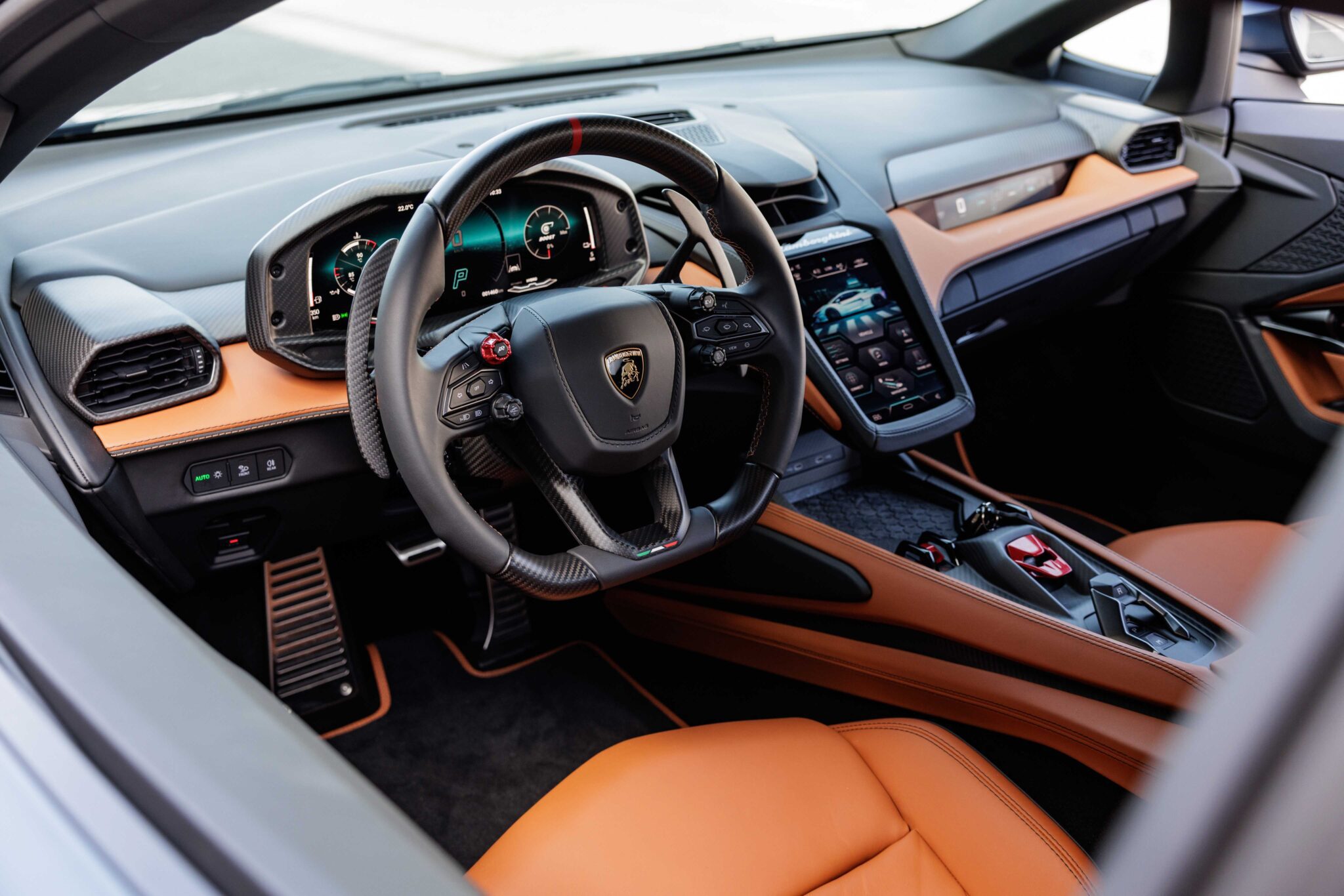
1 of 7

Though the day at Estoril proved beyond a reasonable doubt the performance benefits of arguably the world’s greatest V8 engine working alongside the triple e-motor setup, all the Temerario’s modern tech also improves daily driveability, as well. Push the start-stop button, still under the red jet fighter cover, and the powertrain wakes up automatically into all-electric Citta mode. Though the centrally located battery pack only holds 3.8 kWh of electrons, the Temerario can cruise along for approximately six miles in silence.
Want softer dampers for a long highway journey? No problem, change the drive mode. And Lambo will even sell more comfortable seats with ventilation too.Most importantly, accessing every mode from Citta quiet to full drifting fun never gets confusing thanks to a simplified user interface and plenty of physical switchgear.
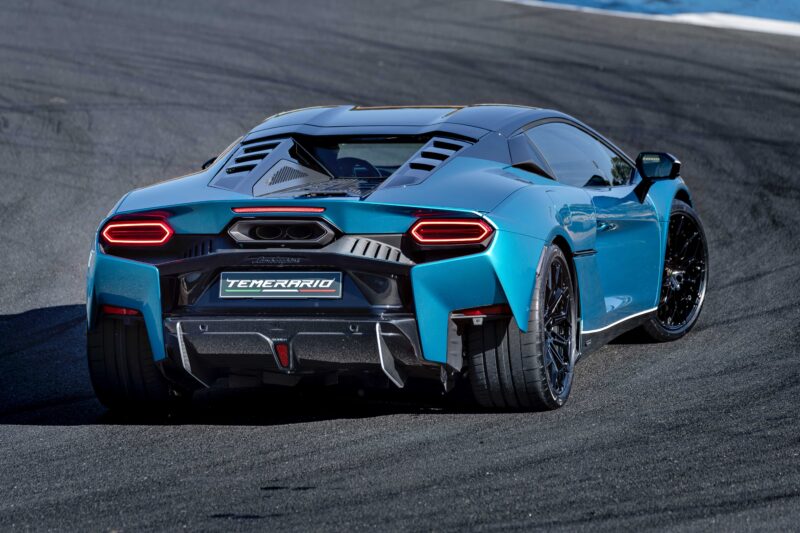
Unlike, for example, another incredible Italian hybrid, the Ferrari 296 GTB – that can easily border on frustrating due to incomprehensible haptic buttons and the lack of a center touchscreen. The 296 GTB delivers similar hybrid punch, but lacks the almost limitless revving of the Temerario. And even if the sublime steering slices perfectly through any corner, the Ferrari also lacks some of the hooligan fun of Lambo’s all-wheel-drive drifter. A McLaren 750S similarly sticks with RWD only and definitely benefits from McLaren’s quintessential priority on weight savings. But the Temerario’s powertrain takes the cake, while contributing to a bit more daily-driver confidence, as well.
From a design perspective, this latest Lambo continues a trend toward classier styling that allows for more apt comparisons to Ferraris and McLarens, not to mention pricing that will likely take abig step up from the Huracán, too. But I also spent plenty of time at Estoril contrasting the Temerario with the 1,064-hp Corvette ZR1 that I drove earlier this year, which proved that four-figure horsepower stats don’t need to cost seven figures.
Lamborghini Temerario Conclusions
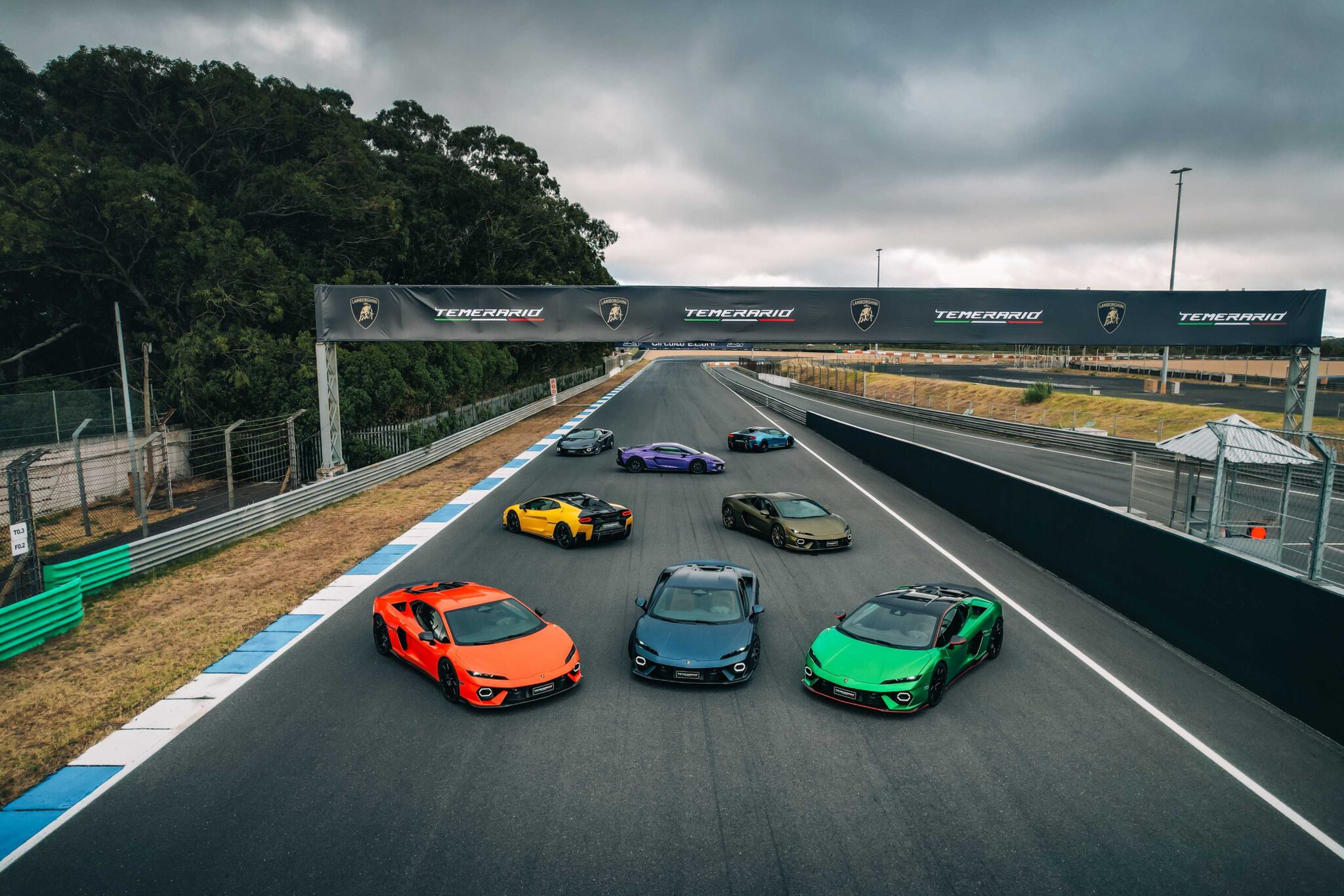
1 of 7

The Temerario’s Gallardo and Huracán lineage shines through, with plenty of cues taken from Revuelto, but the gut-punch of acceleration and track performance most closely resembles the ZR1 that I tested at COTA this past spring. Don’t even ask about Corvette design versus Lambo, though…
And keep in mind, this is just the first Temerario variant. Lambo’s reps on hand stayed mum on potential Evo or STO track specials, much less a Sterrato off-roader. The Temerario starts at $382,654, with the Alleggerita package costing $49,113. Ticking that box improves upon my main two critiques for the car, the lighter steering and underwhelming exhaust note with the base muffler.
Regardless, when specced properly, the Temerario arrives as a stone-cold stunner, maybe the most enjoyable supercar ever to drive hard at the limit. Stupendous technological competence allows the Huracán’s successor to make everyone a better driver, myself included, all from behind the scenes. And might, just possibly, even outshine the V12 Revuelto in terms of true driving delight.
Mercedes-Benz Vision V Preview: A New Concept For Van Luxury Lifestyle
in Mercedes-Benz News, Reviews
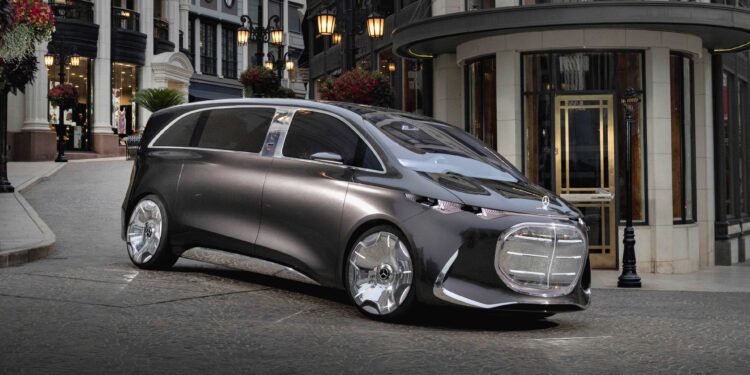
About half the time when I land in Europe for automotive media launch programs, a Mercedes-Benz Metris or V-Class picks me up from the airport. Diesel engine chugging away, stiff suspension sending every last bump in the road straight to my spine, seats that barely recline– at least the air conditioning works, so I don’t overheat after 20 hours of air travel on the typically short trip to a nearby hotel.
Fleet taxis like these represent a perfect application for electric vehicle adoption, thanks to smooth driving dynamics, repeated short journeys interspersed with downtime for charging, and the packaging made possible by skateboard battery layouts. No wonder Mercedes-Benz envisions a global market, and earlier this year, it debuted an all-electric concept van dubbed “Vision V” in Shanghai.
Now, Vision V arrives in the USA for Monterey Car Week 2025, and Mercedes offered select media a chance to preview the concept in Los Angeles the week before. Staged above Dodger Stadium, north of Downtown LA, the van served as a true design exercise, with functional features but not yet ready for journalist driving impressions. So of course, I climbed aboard to fiddle with as many of the screens and seats and nifty tech solutions as possible, while still
knowing that plenty will change – or vanish entirely – by the time the eventual series version reaches production in 2026.
Concept Meets Reality
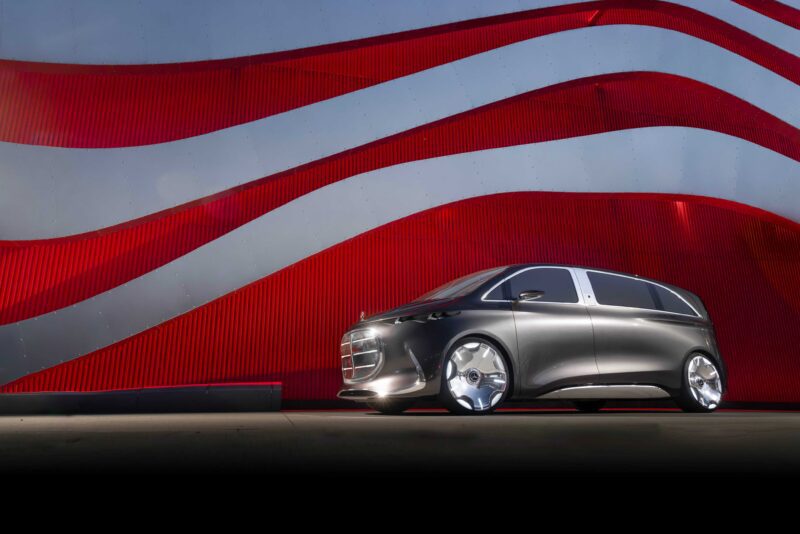
Surprisingly, Mercedes reps on hand insisted that the Vision V very strongly resembles what will come to reality. If so, that design will definitely inaugurate a newly futuristic styling era for vans. An enormous chrome grille dominates the nose, surrounded by 190 illuminated louvers that resemble tiny black-and-white piano keys, as well as another 200 stretching across the recessed headlight bar, complete with tri-star motifs. Above, an illuminated Benz badge gives
way to dual bulges on the “hood” despite the complete lack of an internal combustion engine.
The sides and roofline then swoop backward dramatically. Note the lack of rails for a sliding door or two, for which Mercedes instead invented a nifty hinging system that retracts entirely into the underfloor—both to clean up the exterior styling but also to improve aerodynamics. At the rear, that aero theme continues with 450 more illuminated louvers at the crisp edge of a subtle roof spoiler that’s complemented by a chrome lower diffuser.
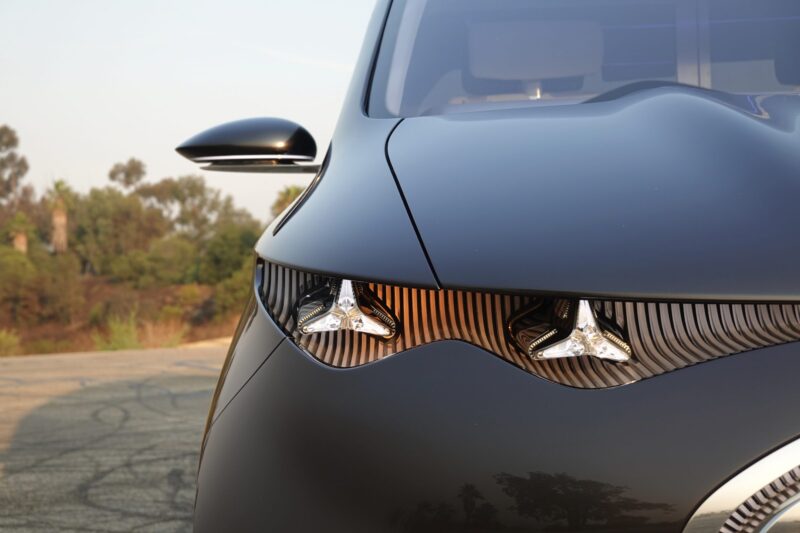
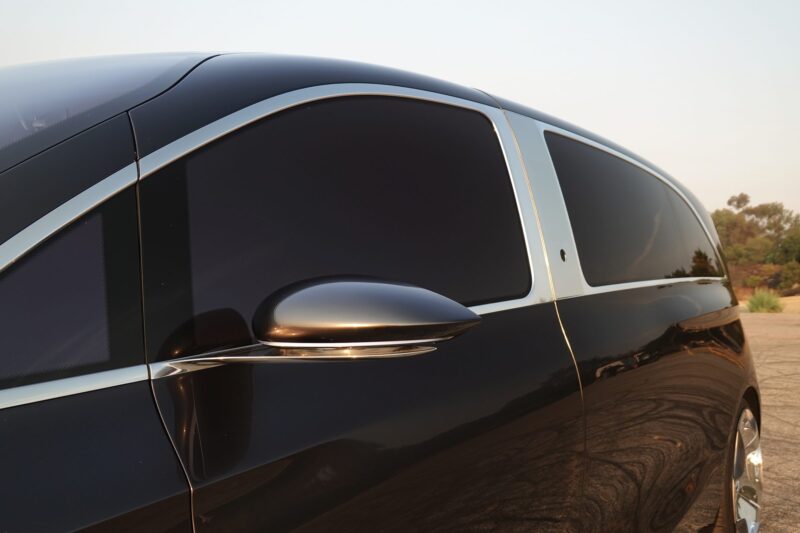
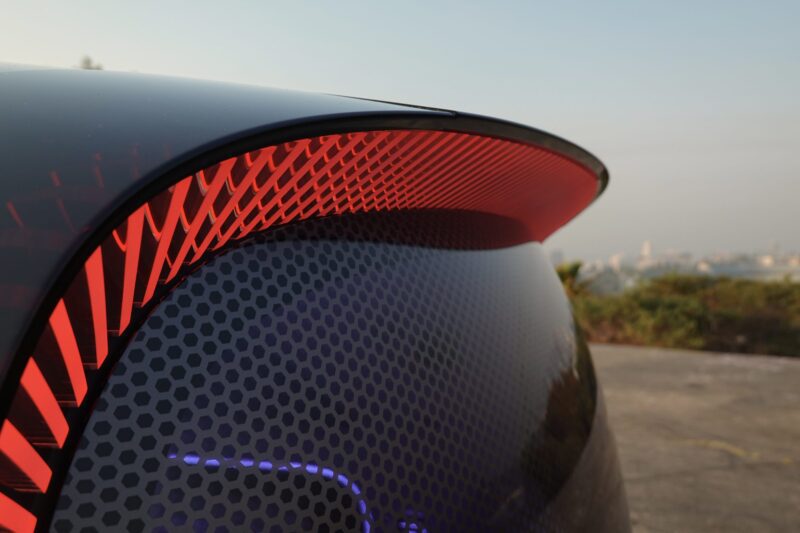
None of the aero elements prioritize downforce, because the Vision V is certainly not a supercar nor a traditional performance vehicle. Instead, performance in this case means range – but Benz declined to share just how good of a coefficient of drag the slick design produces. Which, in turn, suggests how serious the changes to the overall form on the way to a finished production van might be, even if the total exterior dimensions will reportedly measure only fractions of an inch different for everything other than height.
From afar, the design certainly helps to minimize the impression of size: I’d have never guessed the length comes in at a substantial 18 feet, anyway, on a wheelbase of 139 inches. That’s over a foot of wheelbase more than a current S-Class, for context, but under eight inches of added length overall thanks to smaller overhangs past the wheels.
Luxury is Tech, Tech is Luxury
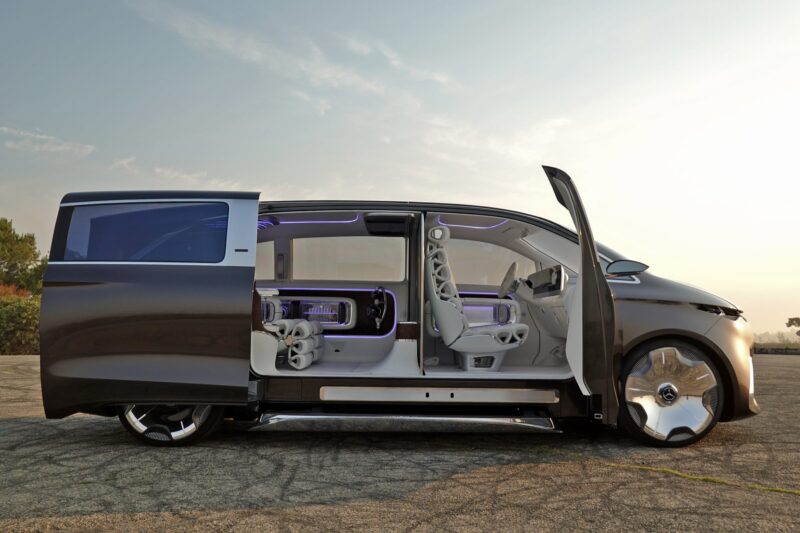
The eventual production versions will skip the infamous EQ naming structure, despite riding three or four inches taller than the Vision V, and will be known as the VLE and VLS. This positions similarly to the GLE and GLS, with the former as more of a people hauler that can seat up to eight, and the latter an executive limousine jam-packed with creature comforts and tech as seen on the concept.
I climbed inside to put a hand on the white Nappa leather and feel the open-pore wood elements of the retro-futuristic aesthetic. Chess pieces in a clear cubby to my left and fine glassware for beverages disappeared from my mind, however, once a massive 65-inch screen unfurled from beneath the floor.
Mercedes calls this rear passenger compartment a “private lounge” and the tech features “interactive worlds.” So the huge screen can obviously play movies and TV shows, while offering a gaming controller setup, online shopping, and even karaoke via a microphone.
A camera hidden into the molding in the ceiling above the screen also allows for video chats– as a further commitment to work-life continuity that Mercedes made possible with a recent Microsoft Teams partnership. But there’s also a calming fireplace mode that drops the screen lower, so that flames become visible beneath the curvature between the floor and pedestal.
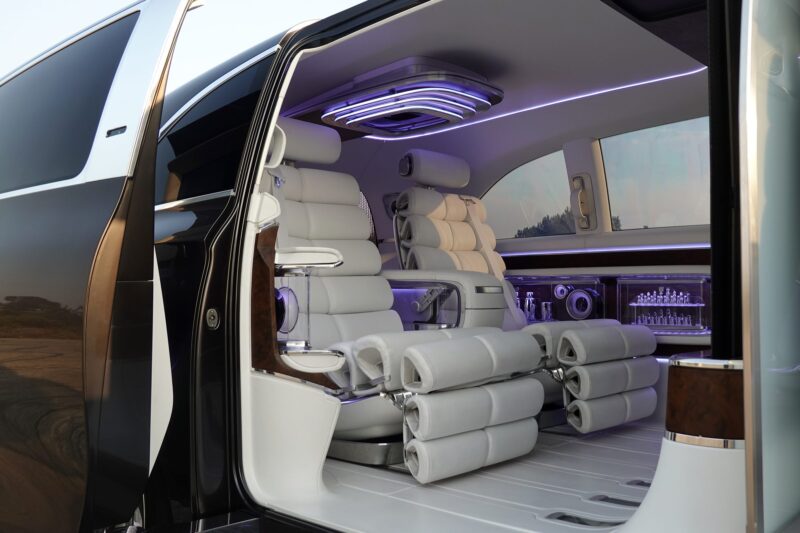
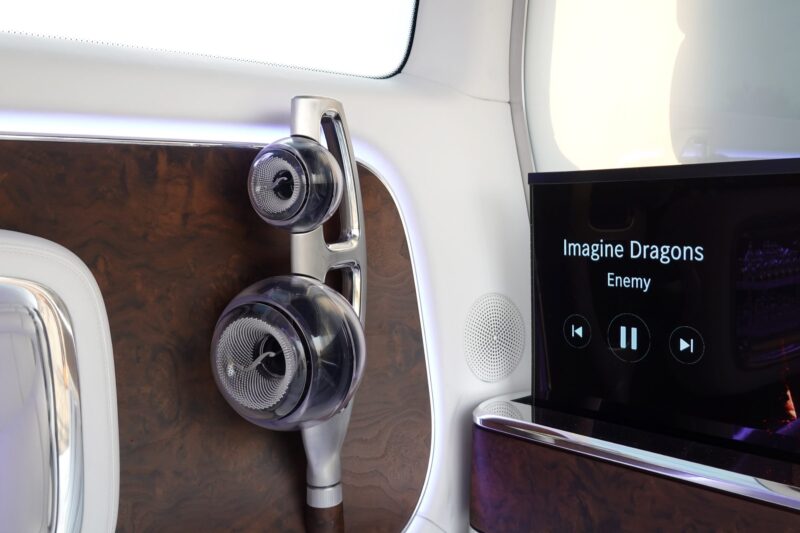
Up to 42 speakers, including in-seat exciters, and seven digital projectors further increase the immersion into an inescapable digital world, though I actually enjoyed a digital detox more by reclining the surprisingly comfortable seats as far as possible.
These cross-cylindrical pads will likely not survive to production, but actually provide a pillowy level of support that works well whether upright or in a nearly flat sleeping mode—great for catching up on shuteye after a long flight while the chauffeur drives, or alternatively while plugged in at a charging station.
So far, the Vision V’s EV range and charging stats remain a mystery. Mercedes declined to specify battery capacity, other than a range target of 300 miles. The skateboard battery will run on an 800-volt architecture; however, to improve charging speeds, and will come in both front- wheel-drive (for efficiency) and 4Matic layouts. Whether that means a single, dual, tri, or quad-motor system also went unanswered.
I can confirm that the vans will use rear-wheel steering to further optimize the skateboard battery’s low center of mass and suspension to make driving as similar to a normal car as possible, rather than a Spartan delivery van. And in the USA, Mercedes plans to use NACS charge ports to enable access to Tesla’s Supercharger network, as on the new electric CLA-Class.
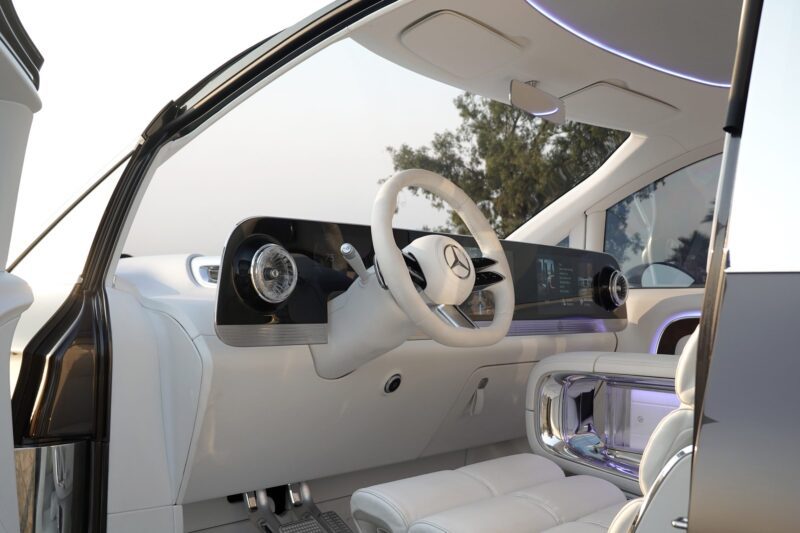
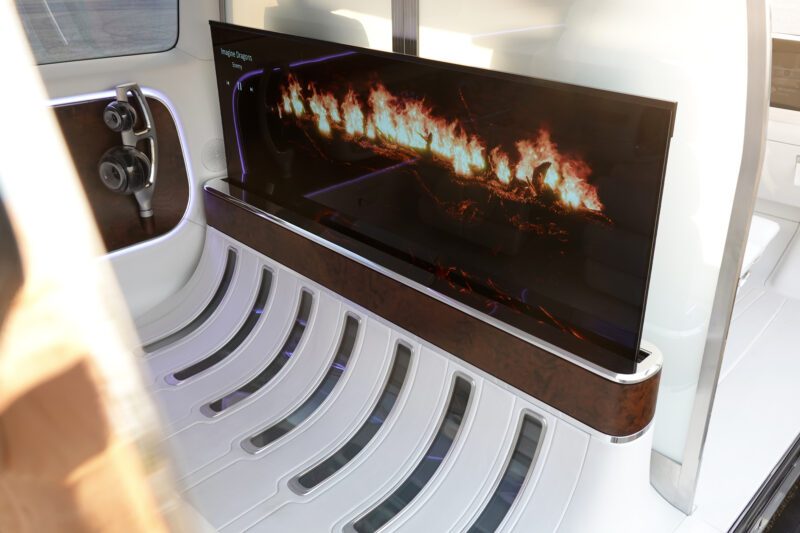
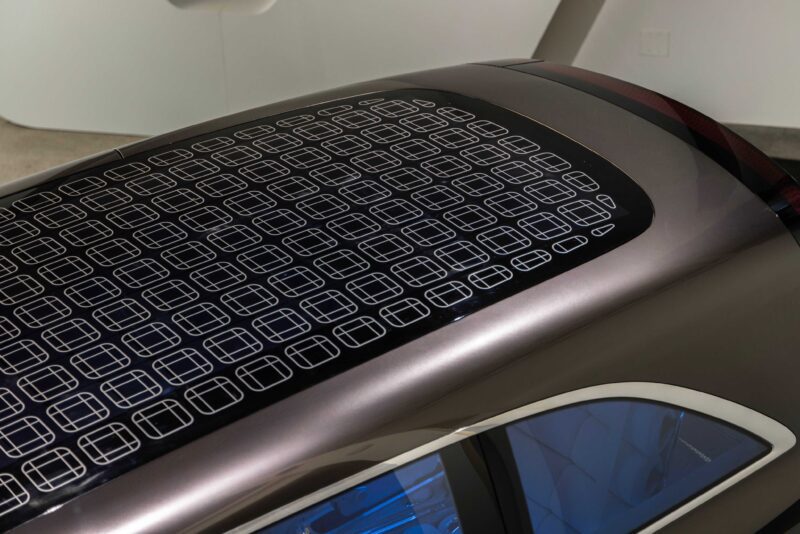
Rear-wheel steering should improve maneuverability in tight European city streets, which helps both fleet drivers and private buyers alike. And the Vision V’s front cockpit looks almost as comfortable as the rear, despite the inability to recline the two seats nearly as far. But plenty of high-tech inclusions hint at a market not just dedicated to the chauffeur and taxi driver.
For Mercedes, that means a ton of screen, or the infamous three “Superscreen” displays that stretch all the way across the dash. But luxury touches throughout include the similar seats, metal throttle and brake pedals, and glass cases in the doors that match the rear’s—for holding sunglasses, this time, not champagne flutes.
Separating the rear passenger compartment from the front, an expansive liquid-crystal pane of glass can switch from clear to opaque in milliseconds. The same goes for the side windows, while the roof gets a full canopy shade. And the roof even features 168 solar cells, which can charge at rates up to 539 watts.
Converting that to as much as 3.44 kilowatt-hours on a sunny day means that the roof alone might contribute to low double-digit range increases without ever plugging into a charge station – enough for many drivers who only commute short distances to and from work. Can the Vision V Revive Van Life in the USA?
Can the Vision V Revive Van Life in the USA?
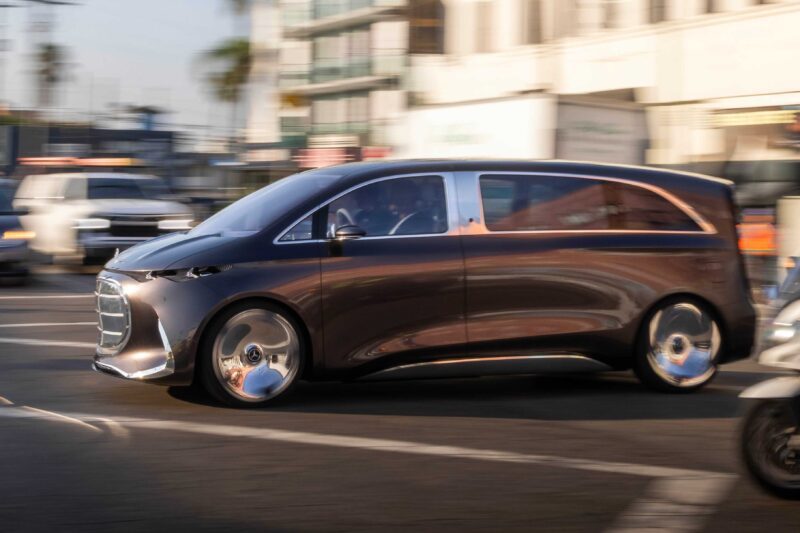
To my eye, the Vision V caters less to a private buyer, and barely even to the American market. Here, luxury hired cars will probably switch over from ubiquitous Escalades to GM’s own massive EV, the Escalade IQ. The more widespread acceptance of chauffeured vans in both Europe and Asia seems more ripe for the Vision V to succeed.
I also left the preview surprised at how little the Vision V prioritized autonomous driving capabilities, in the era of Waymo and Zoox, and Tesla’s “any day now” Robotaxi. Mercedes arguably leads the industry with the only Level 3, or truly hands-free, driving system available on the market as an option on the S-Class and EQS since model year 2024. The fact that this concept van even includes a steering wheel, therefore signals that perhaps Mercedes still views
full autonomy as far enough in the future that it’s still worth developing a whole new vehicle platform in the interim period.
Suffice to say, the Vision V raised as many questions as any typical concept car—or even more, given the unique nature of a futuristic electric van. Regardless of exactly how much of the design and technology eventually survives to the production VLE or VLS, I fully expect to get picked up in an electric Mercedes van for those airport transfers starting regularly just next year.
View All Mercedes-Benz Metris For Sale
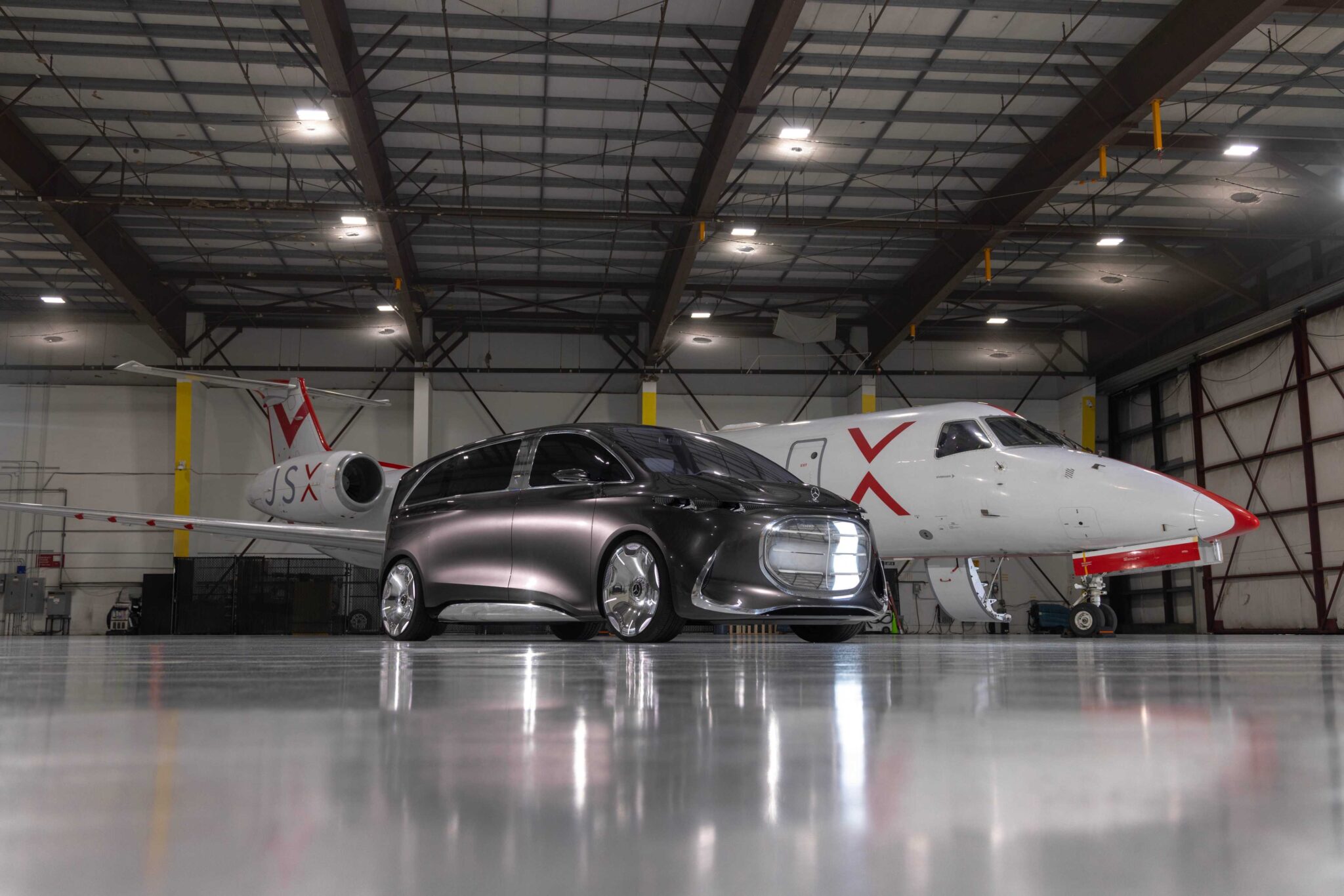
1 of 12

Images Source: Michael Van Runkle, Mercedes-Benz
New 1-of-25 Mercedes-Maybach S 680 Emerald Isle Revealed
in Mercedes-Benz News, Mercedes-Maybach, S-Class
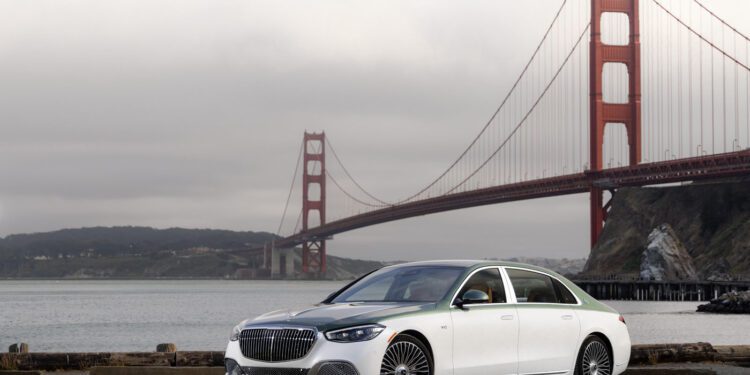
Mercedes-Benz celebrates coastal California beauty with a stunning Maybach sedan.
The Mercedes-Maybach lineup has taken a celebrated, and iconic name that has earned a reputation for ultra-luxury in automotive history and pop culture alike, and transformed it with the introduction of not only luxury sedans with cutting-edge technology and engineering, but also SUVs, electric vehicles, and sporty roadsters, as well. However, it’s the Mercedes-Maybach S 680, the V12-powered flagship ultra-luxury sedan from the Mercedes-Maybach lineup, that is the subject for its latest unique and exclusive creation: the new Mercedes-Maybach S 680 Emerald Isle.
Inspired by the stunning natural beauty of Pebble Beach and the Monterey area of California, the new S 680 Emerald Isle is debuting just in time for the highly anticipated and prestigious Monterey Car Week. The vehicle is limited to only 25 units, it’s exclusive to the United States, and it’s coming to Mercedes-Benz dealerships in fall 2025.
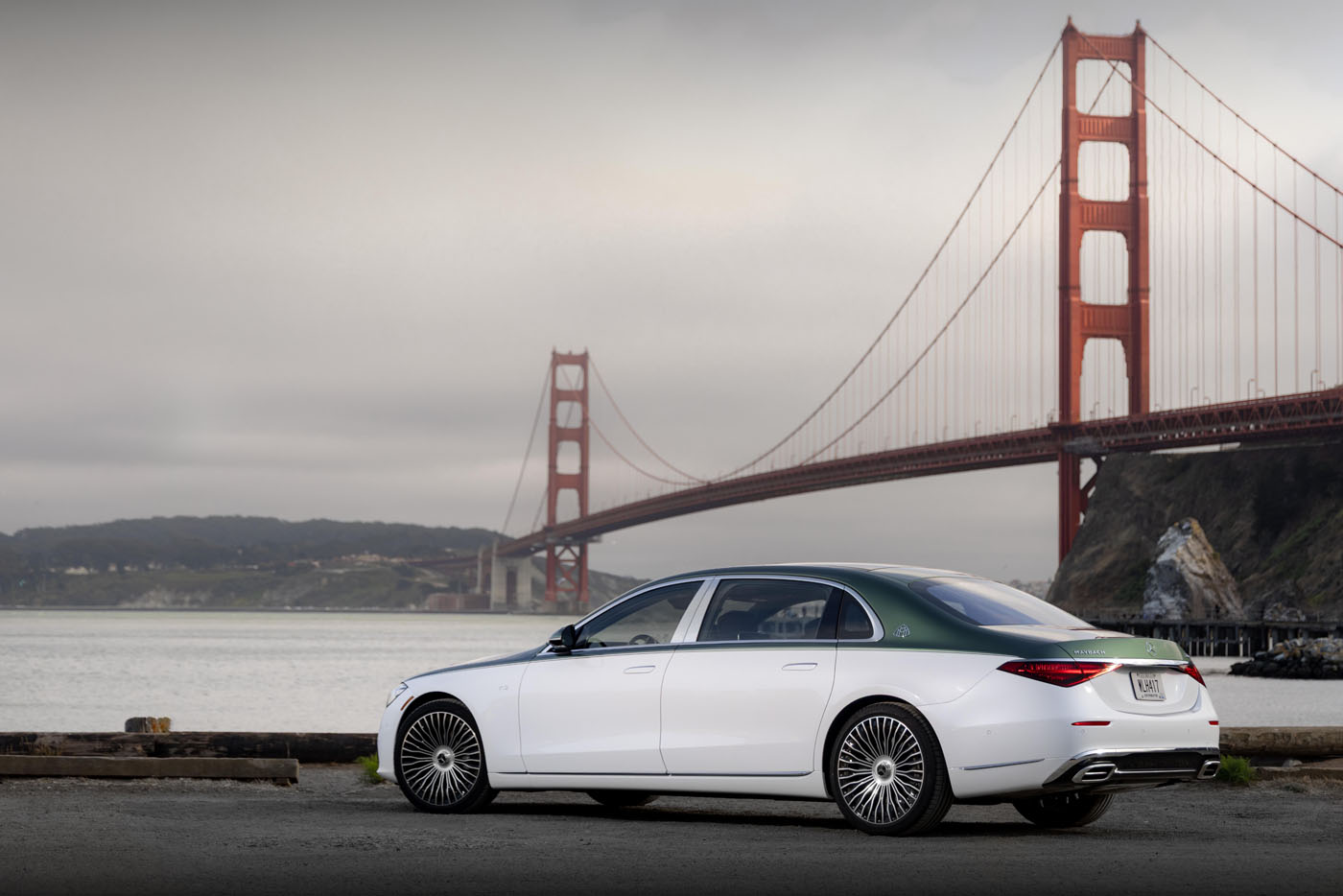
1 of 21

The immediate eye-catcher regarding the new S 680 Emerald Isle is its unique two-tone paint, taking inspiration from the cypress trees and white sand beaches seen in the area and pairing MANUFAKTUR Exclusive Mid Ireland Green Metallic with MANUFAKTUR Moonlight White Metallic. The interior, meanwhile, features hand-stitched Nappa leather upholstery in MANUFAKTUR Exclusive Light Brown, which is specific for the edition, paired with a Nappa leather headliner that includes its own quilted diamond pattern like the seats.
The four-seat configuration allows all passengers the ultimate Maybach luxury experience, while both special badging throughout and a bespoke fragrance inspired by the natural environment of coastal California help highlight the unique, ultra-exclusive special edition. Already based on an incredible ultra-luxury sedan, the new Mercedes-Maybach S 680 Emerald Isle is a masterpiece of ultra-exclusive Maybach excellence coming just in time for Car Week.
View All Mercedes-Maybach S 680 For Sale



